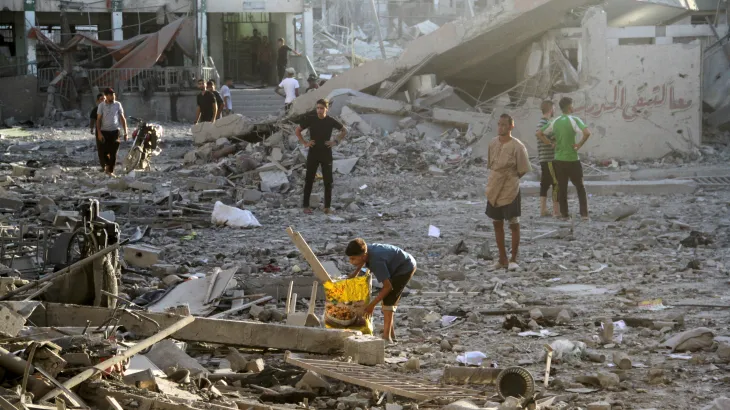At least 65 Palestinians have been killed in Israeli airstrikes across Gaza overnight, including people at a school sheltering displaced families, according to Gaza medical sources. Meanwhile, three more Palestinians were confirmed dead, and many more were injured when Israeli tanks pushed into areas of Khan Younis, bringing the violence in the southern part of the enclave to new heights.
This lethal rise has been taken alongside diplomatic efforts in the area. During a joint press conference with Iranian President Masoud Pezeshkian, Qatar’s Emir Sheikh Tamim bin Hamad al-Thani mentioned his country’s readiness to facilitate a truce in Gaza amid heightened tensions. Doha has played an important role in attempts to bring people together, but the talks stalled with few negotiations.
Over nearly a year of the Israeli-Palestinian conflict, more than 41,600 people have died due to military actions taken by Israelis. Overnight Israeli tank raids in eastern and central Khan Younis killed at least 40 people and injured dozens more, according to the health ministry. In Gaza City, two separate airstrikes killed 22 Palestinians–17 of whom were killed in an Israeli attack on a school that served as a shelter for displaced families.
Another strike hit the Al-Amal Orphan Society, where five people died.
With violence intensifying, an Israeli airstrike struck the Nuseirat Girls School, which was a shelter for displaced Palestinian families, killing three and leaving 15 others injured.
Tensions rose even higher after Iran fired ballistic missiles in the direction of Israel last week in retaliation for Israel’s ongoing military campaign against Hezbollah in Lebanon. Now, Israel has vowed to take the fight to the Iranians, with Prime Minister Benjamin Netanyahu using a high-level cabinet meeting to issue a warning about Iranian actions: “We will operate with force.”.
According to reports, Palestinians cheered as rockets were fired toward Israel. However, some were intercepted by Israel’s defence system, known as Iron Dome, and fell back into the enclave without causing significant human losses.
Diplomatic Efforts Amid Escalation
Iran’s President Pezeshkian becomes the first president of this country to make an official visit to Qatar. Speaking at the joint press conference, Pezeshkian declared that while Iran pursues “security and peace,” it was Israel that had escalated the conflict by eliminating the leader of Hamas, Ismail Haniyeh, in Tehran.
The international community’s response has been condemned by Pezeshkian, who believes that “Europeans and the US said if we don’t act, there will be peace in Gaza within a week. We waited, but they increased their killing.”
He supports having direct, close bilateral relations with the nation and participating in the Summit of Asia Cooperation Dialogue in Qatar. He also emphasised the need for Asian countries to collaborate in preventing further Israeli actions and in stabilising the already very tense Middle East region due to continuous hostilities.
As events unfolded, the world waited with bated breath, hoping that diplomacy would ease the crisis and avoid more bloodshed. However, military actions continue, and very little has been accomplished in serious negotiations over a possible ceasefire, so the region is perilously on edge.















